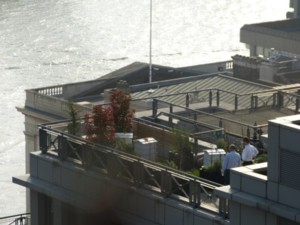We are developing the social individualist meta-context for the future. From the very serious to the extremely frivolous... lets see what is on the mind of the Samizdata people.
Samizdata, derived from Samizdat /n. - a system of clandestine publication of banned literature in the USSR [Russ.,= self-publishing house]
|
Having been very busy these last few days, I hadn’t had a lot of time to comment on the latest attempt by the UK government to tighten its surveillance powers over the internet and other forms of communication. Another article at the Daily Telegraph gives some flavour of what is at stake.
Any relief that the Cameron administration had decided to scrap proposed compulsory ID cards when it got into power have been short-lived. As predicted, once the first flush of some liberal optimism had faded, this government, like all of its peers, reverts to type. In fact, I am slightly surprised it has taken this long.
Last week I took a trip up to the top of the Monument, which is a memorial to those who died in the Great Fire of London. I of course took lots of photos. And in a posting on my personal blog (now revived from recent hibernation), I also had a moan about the new wire netting that they have installed at the top of the Monument, in place of the old, more digital camera friendly, prison bars that used to be there.
Here is one of the snaps I snapped that day, featuring this new wire netting:
Now, it so happens that earlier last week, the night before my trip to the Monument, I also watched a TV show about bees. Most of it was about African bees migrating across the Savannah, with lots of lurid close-ups of bees looking like alien monsters. But, as this lady explains, at the end of this show they bolted on a short and quite different segment about how bee keeping, waning in the British countryside in the face of mechanised agriculture and pesticides, is now on the rise in the big city. It was like two entirely separate shows. Very peculiar. Luckily for me, I found both shows interesting.
Anyway, take a look through the centre hole in the photo above. What do you see? I’ll tell you what you see. You see beehives. Here’s a closer look at them:
And at two of them even closer:
The first of those three beehive snaps was taken by mistake, as it were. As in: I only realised that bee hives were involved in it when I got home. But, provoked by having watched that TV bee show, I photoed the two subsequent bee hive snaps on purpose.
The anti-technological-progress, anti-capitalist take on this story is that technological progress, capitalism etc. is making life hell for bees in the countryside. And for the time being, technological progress stroke capitalism is indeed turning the countryside from bee heaven into something rather less bee hospitable, although it may soon work out how to refrain from doing this and how to switch the countryside back to being bee heaven again.
Meanwhile, cities like London, with all their gardens full of varied flowers, are becoming new bee heavens.
The other day at a Starbucks in a motorway services I was served by a young man who was, frankly, a bit useless. He couldn’t do anything without help from another member of staff who looked somewhat exasperated. I found myself speculating about whether he was worth £5 an hour.
Tim Worstall has for a long time been writing about the connection between the minimum wage and youth unemployment.
The British government obviously understands it, but won’t get rid of the minimum wage. Instead, starting today, if you employ fewer than 50 people you can apply for a £2,275 wage incentive in return for employing a young person.
In an amusing side-note, the Department for Work and Pensions, whose idea this is, seems slightly worried about age discrimination legislation. The big game of Nomic is getting increasingly self-contradictory.
The thing I learned from the Beaconsfield by-election was that wars make Prime Ministers popular.
– Tony Blair, quoted by Max Hastings in a BBC television programme this evening about the Falklands War and its impact upon subsequent British military policy. The by-election in question happened during that war, and was a landslide victory for Margaret Thatcher’s Conservatives, and Tony Blair’s only electoral reverse.
I was rather pleased when my previous posting generated a large number of excellent comments – that’s not always the case. However, I was less pleased when many of them suggested (shock-horror!) that I might be wrong.
Many complained about my views on modern German music. Let me explain where I am coming from. As far as I am concerned rock (and I use the term in the widest possible sense) started in 1962, peaked in 1967/8 and had fizzled out by 1987. Very little of it was German.
A good example of this is provided by a programme called “Pop goes the Sixties” which occasionally gets repeated on the British channel Yesterday. Recorded at the very end of the 1960s, it is a joint Anglo-German production even down to the presenters. While featuring plenty of British artists such as The Who, The Kinks and Sandie Shaw, it manages time for but one, single, solitary German (Horst Jankowski, in case you should be wondering).
And after 1969? All I can think of are: Frank Farian, Giorgio Moroder and Kraftwerk. Sure, there may have been others (Tangerine Dream and the Krautrock scene got a mention) but they weren’t massively successful. I am not even sure they were particularly influential but I am happy to be corrected.
That’s up to 1987, where my knowledge fizzles out. And that seems to be about where the German rock that people were talking about starts.
Which makes sense. In his comment, Brian Micklethwait suggested that there are two types of knowledge: implicit knowledge, favoured by the British, and explicit knowledge, favoured by the Germans. A few years ago, at a railway conference in Cologne, I encountered a rather good example of this. German Railways had decided to spruce up their stations. So, what was the first thing they did? Spend a year working out what a station was. Of course, they did. What else would you do?
So, it comes as no surprise that the Germans were no good at pop music in the 1960s – no one had written the manual.
Talking about something other than music. I was kind of pleased when one commenter suggested that German car makers weren’t nearly as cutting edge as I’d thought. This all fits into the idea of Germans thinking first, writing second and acting third.
Unfortunately, that leaves the mystery of how they invented the car (and, one might add, the A4 rocket and Me262) in the first place. Perhaps it required a lot of the explicit knowledge that science supplies.
|
Who Are We? The Samizdata people are a bunch of sinister and heavily armed globalist illuminati who seek to infect the entire world with the values of personal liberty and several property. Amongst our many crimes is a sense of humour and the intermittent use of British spelling.
We are also a varied group made up of social individualists, classical liberals, whigs, libertarians, extropians, futurists, ‘Porcupines’, Karl Popper fetishists, recovering neo-conservatives, crazed Ayn Rand worshipers, over-caffeinated Virginia Postrel devotees, witty Frédéric Bastiat wannabes, cypherpunks, minarchists, kritarchists and wild-eyed anarcho-capitalists from Britain, North America, Australia and Europe.
|






